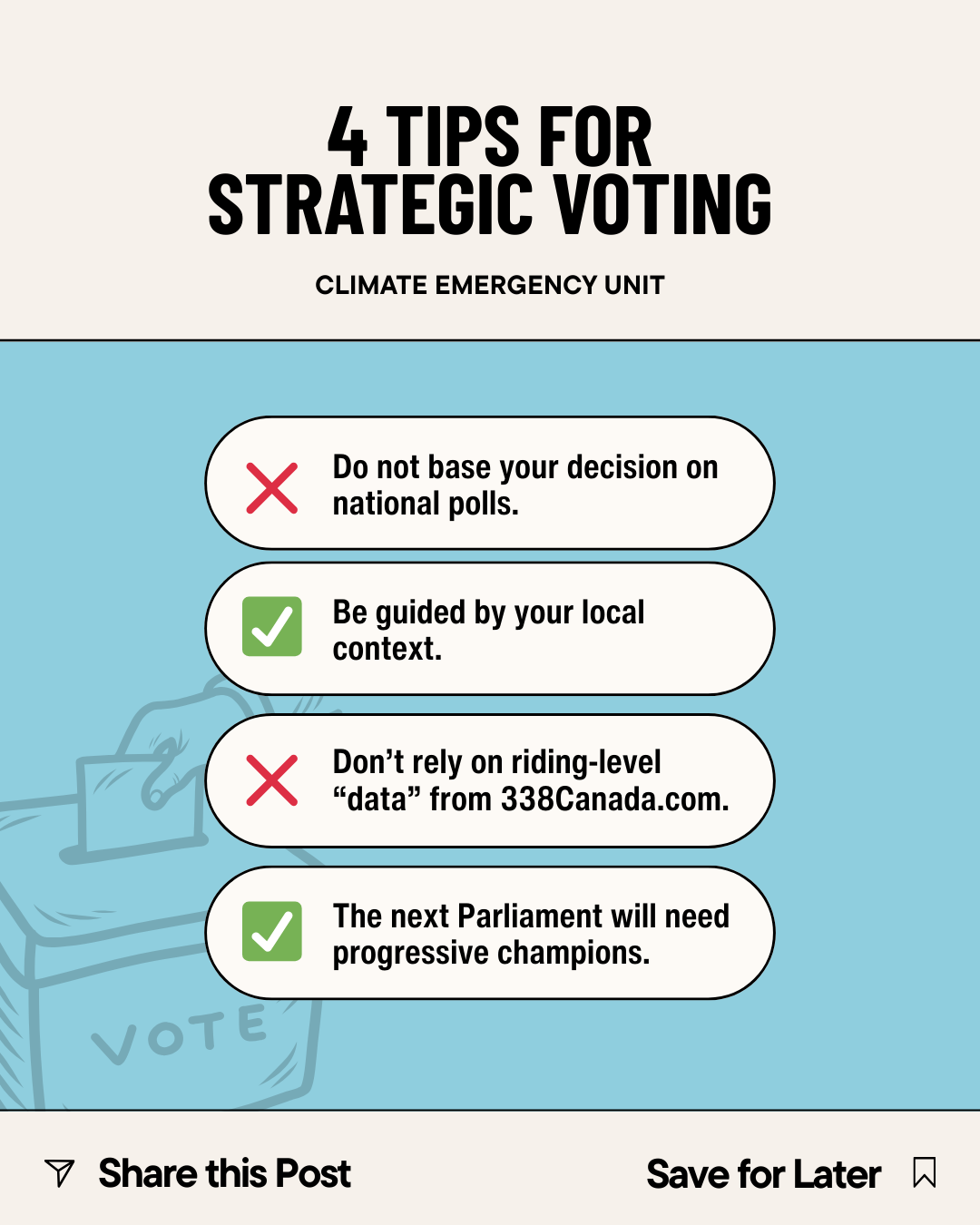Four tips for progressives wondering about strategic voting: Vote strategically, but do so wisely and attuned to your local context
[This piece was originally published in Canada’s National Observer here.]
Like many, I strongly dislike our current first-past-the-post electoral system. It upsets me that people feel compelled to vote strategically, mainly to prevent an outcome they most oppose, rather than voting for the person or party they most support. I dearly wish we had a form of proportional representation that would liberate people to vote their values and produce a Parliament that best captures the preferences of Canadians.
But until that happens, this is the system we have, and we are forced to make the best of it.
Many progressive voters are now wrestling with how to cast their ballot. The priority for most rightly remains how to prevent a Conservative win (still a possibility), understanding that a Pierre Poilievre-led government would be disastrous across many domains – climate progress; the survival of vital public institutions like the CBC; immigration, foreign policy and foreign aid; Indigenous and trans rights... the list is long. Poilievre’s politics and agenda disturbingly mirrors that of Trump.
But it is also the case that if the Carney-led Liberals secure a sweeping majority (which according to the latest polls is not only a distinct possibility, but likely), many progressives are going to wake on April 29 feeling deep regret, a lament that will likely only grow over the ensuing months as it becomes clear that on numerous policy fronts (although not all), Carney is to the right of Trudeau. And yet, too often the call to “vote strategically” is code for “vote Liberal.”
Historically, as many progressives understand, it is under minority governments that we have landed our biggest and most enduring policy wins. Minority governments are forced to be more accountable. And for social movements, minority parliaments provide us with the most leverage to successfully campaign for progressive policy wins.
But how best to produce an electoral outcome that speaks to all these moving pieces? Here are four tips for the perplexed progressive voter:
1. Do not base your decision on national polls. We don’t directly elect the government or the Prime Minister. Rather, in our Parliamentary system, we are in fact engaged in 343 local elections, each of which will select their member of Parliament. Often, national polls do not reflect the reality in your local riding, where party preferences may be different, a local incumbent may be particularly popular, or an inspiring new candidate may be galvanizing excitement.
That last point merits special attention. An inspiring candidate (existing or new) can attract hundreds of volunteers, and the resulting ground-game can result in a local story that defies the national narrative. I’ve been a volunteer in enough local campaigns to have seen this first-hand – bold and exciting candidates can increase riding-level support for their party, even as support for that same party is declining overall.
Trying to map national or provincial polling onto local ridings can produce terrible predictions. Take the recent Ontario provincial election, for example, where the pollsters predicted the collapse of the Ontario NDP and that the Ontario Liberals would become the official opposition. That didn’t happen. Instead, while the province-wide polling wasn’t wrong, the Ontario NDP ended up with almost twice as many seats as the Liberals. As longtime pollster Allan Gregg wrote in a Toronto Star postmortem, “The common wisdom that candidates matter far less than parties seems to be less true today than in the past. … We [the pollsters and pundits] completely missed something that was happening on the ground.”
2. Be guided by your local context. Far too often, progressive-leaning voters are saying, “I usually vote NDP (or Green), but in this election, I’m too worried about a Poilievre win, and so I’m voting Liberal.” That may make good sense in some ridings. But not all! In some ridings that have a NDP or Green incumbent, or an inspiring new NDP or Green candidate (especially if combined with a less-than-inspiring Liberal candidate), voting Liberal could merely further split the progressive vote, allowing the Conservative candidate to come up the middle. There are a number of Vancouver Island ridings where this exact scenario is at risk of playing out.
Moreover, despite the Conservatives retaining strong national support, many people live in ridings where the Conservatives have no chance of winning and often run third (such as my own riding in East Vancouver). In those ridings, people should feel free to vote their values without fear of helping to produce a Conservative win, and indeed, by not voting Liberal, you may be helping to produce a more progressive minority Parliament outcome. Figuring this all out isn’t easy, but again, note point #1 above.
3. In seeking to determine the local context, do not rely on riding-level “data” from 338Canada.com. We are all desperate for riding-level polling to help inform our strategic voting decisions. Consequently, many turn to 338Canada.com or SmartVoting.ca for local guidance, as both publish riding-level data that claims to show the parties’ relative standing. The problem, however, is that these entities are not actually doing local polling. Rather, both are engaged in a modelling exercise. As 338Canada explains on their website, it is engaged in “a statistical model of electoral projections based on opinion polls, electoral history, and demographic data.” Similarly, SmartVoting.ca states, “Our advanced political modeling analyzes polling, trends, and historical patterns to recommend the smartest strategic vote in each riding.” Take these claims with a hunk of salt. Effectively, what both are doing is taking the results of the last election in each riding, and then mapping the latest aggregated, and mostly national, polling data onto those results. But this methodology fails to capture the popularity of local candidates (incumbent or new) or the potential strength of an inspiring local campaign. As a result, their riding-level predictions can prove disastrously wrong.
Genuine riding-level polling can be done, and sometimes is, but it’s hard to come by. It is very expensive to secure a robust and statistically-relevant sample size, and consequently most polling firms don’t do it. Even those who do often end up with inaccurate results given the challenges (especially if over-relying on robocalls or methods that make it hard to confirm a person’s riding). That said, a local organization or group of concerned citizens could commission their own genuine, robust riding-level poll from a reputable polling firm. No doubt some are and hopefully more will follow.
4. The next Parliament will need progressive champions. To be clear, at this stage in the game, we will either have a Liberal or Conservative government, and given that choice, I hope the Liberals win. But I also want that government to have its feet held to the fire, and we should all want to see a strong contingent of climate and social justice champions elected who will do just that. If you are lucky enough to live in (or near) a riding where such a champion has a chance of winning, then please do everything you can to help get them over the line. LeadNow recently published a list of candidates they consider “Raise the Bar” champions worthy of support, but there are others beyond that list. We desperately need to elect people who genuinely understand the intersecting crises we confront and who will insist on bold action. With the country on fire, we need to elect political firefighters.
The take-away from all this: by all means, vote strategically. This election is too important to do anything else. But do so wisely. A strategic vote looks different in each of our 343 ridings.
And the day after the election, we all need to get right back to work ensuring the next government is ready to tackle the crises we face at scale.

